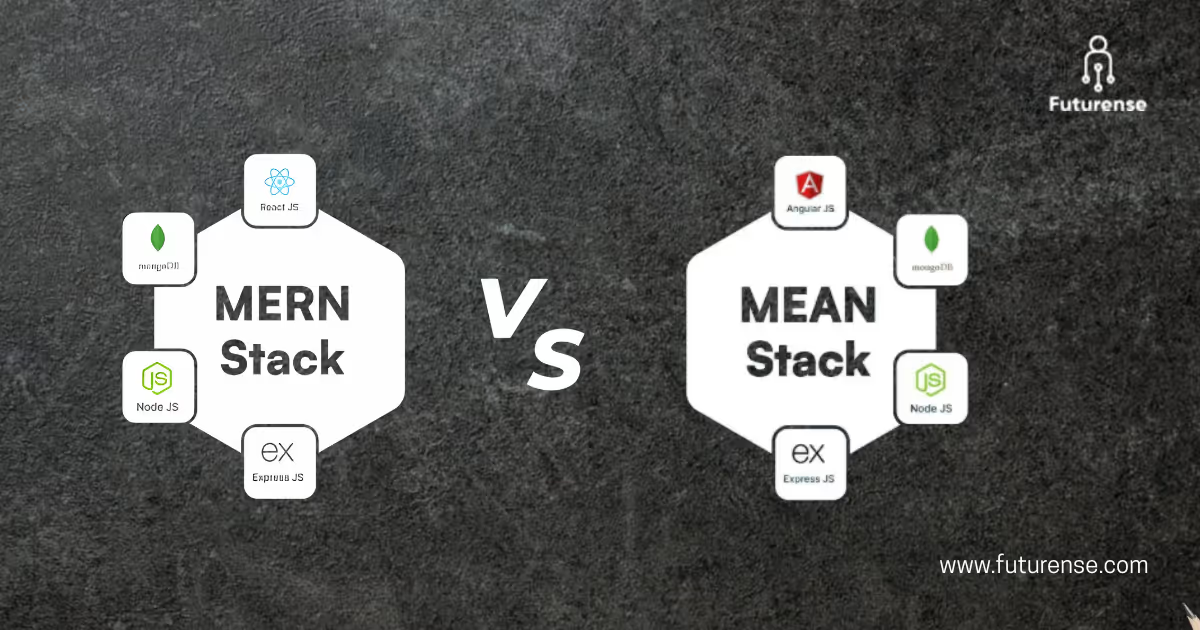The Difference Between MEAN Stack vs MERN Stack for Web Development is a crucial consideration for developers aiming to build scalable and efficient applications. While both are popular full-stack JavaScript frameworks sharing the same backend foundation with Node.js and Express, the real distinction lies in their frontend technologies—Angular for MEAN and React for MERN. This difference directly impacts the development approach, learning curve, and career opportunities in the tech industry. In this guide, we’ll break down the key distinctions, explore practical use cases, and share career-focused insights to help you choose the stack that best aligns with your goals.
What is the Core Difference Between MEAN Stack vs MERN Stack for Web Development?

The core difference between MEAN Stack vs MERN Stack is their frontend JavaScript component: MEAN uses Angular while MERN uses React. Both stacks use MongoDB (database), Express.js (backend framework), and Node.js (Javascript runtime) for the server-side and database layers which leads to “JavaScript everywhere” development.
This key difference shapes their overall architecture and use cases where Angular gives way for a structured framework, React is a more flexible, component-based library.
Here’s a quick comparative overview:
What is the Full Form of MERN Stack and MEAN Stack?
Understanding the MERN stack full form and MEAN stack full form clarifies their components:
MEAN Stack Full Form:
- M - MongoDB: NoSQL database
- E - Express.js: Node.js web framework
- A - Angular: Frontend framework
- N - Node.js: JavaScript runtime
MERN Stack Full Form:
- M - MongoDB: NoSQL database
- E - Express.js: Node.js web framework
- R - React: Frontend library
- N - Node.js: JavaScript runtime
Both stacks rely on JavaScript across the entire application, simplifying development.
Also Read: What is MERN Stack?
Which is Easier to Learn: MERN Stack or MEAN Stack?
MERN stack is considered easier to learn, especially for beginners due to React’s simpler, component-based approach and its focus on JavaScript. React is also flexible enough for a quicker start in building user interfaces.
Angular in MEAN stack has a steeper learning curve as its a comprehensive framework requiring knowledge of TypeScript and its opinionated structure making it more challenging for newcomers.
Which Stack is More in Demand for Jobs in 2025 in India?
MERN is more in demand especially in India, particularly among startups and product companies, driven by React’s widespread adoption. Companies are actively seeking MERN Stack Developers or Full-Stack React Developers.
- MERN Job Titles: MERN Stack Developer, Full-Stack React Developer.
- MERN Salary: ₹6–12 LPA (average for experienced roles).
- MEAN Demand: Large enterprises, government projects and large-size IT services firms increasingly seek MEAN developers because of Angular’s structure and maintainability for complex applications.
Which Stack is Better for Building Scalable Applications?
Both MEAN and MERN can build scalable applications, but they excel in different scenarios:
- MEAN (Angular): MEAN is often preferred for large-scale, enterprise-level applications which require a proper structure and long-term maintainability with large development teams. Its comprehensive framework ensures consistency.
- MERN (React): Ideal for dynamic single-page applications (SPAs) and rapid development projects. Its component-based flexibility and efficient Virtual DOM suit interactive, user-driven applications.
MEAN and MERN stack are suited for different purposes and their demand ultimately depends on the kind of enterprise or project that you want to work with.
Does MERN Stack Have Better Community Support Than MEAN Stack?
Yes, MERN generally has a larger and more active developer community, primarily thanks to React's immense popularity. This translates to:
- More Resources: Abundant tutorials, libraries, and tools.
- Active Forums: Quick solutions and widespread community assistance.
- Higher Job Market Activity: Reflects the larger developer base and adoption.
While Angular has a strong, mature community, React's ecosystem is often seen as more dynamic and extensive.
Which Stack Should I Choose for My Web Development Career?
The choice depends on your learning style and career aspirations:
- Choose MERN if: You're new to web development, prefer faster learning, enjoy building interactive frontends, and aim for product-based companies or startups. If you’re new to web development and enjoy a flatter learning curve, go for MERN stack as it's more flexible and the interface makes it easy even for beginners to become good at it. With MERN stack, you can target startups or product-based companies and enjoy an exciting work-life.
- Opt for MEAN if: You prefer a structured learning program and want to work with large enterprises or are comfortable with TypeScript and object-oriented programming.
Both offer excellent career prospects; many developers learn both over time.
Futurense Programs for Full-Stack Development
Futurense offers industry-aligned programs to help you master full-stack development, including technologies within MEAN Stack vs MERN Stack. Our courses are designed to make you job-ready with practical, project-based learning and career support.
- PG Diploma & MTech in Artificial Intelligence – IIT Jodhpur: Includes relevant full-stack modules for AI-powered applications.
- Advanced Certification in AI Engineering & AIOps – IIT Roorkee: Strengthens skills for deploying AI models via web applications.
Final Thoughts
Understanding the Difference Between MEAN Stack vs MERN Stack for Web Development is essential for making the right choice in your career or projects. Both stacks offer powerful tools for building modern, scalable applications, but your decision ultimately depends on your learning preferences, project requirements, and long-term goals. MEAN, with Angular, provides a more structured framework, while MERN, with React, offers flexibility and a huge developer community. By evaluating their strengths and aligning them with your ambitions, you can confidently choose the stack that will best accelerate your growth as a web developer.
Frequently Asked Questions (FAQs)
Are MEAN and MERN both considered "full-stack" development?
Yes, both MEAN and MERN are full-stack development stacks that cover backend, frontend and database components enabling complete web application creation.
Can I use other databases with MEAN or MERN besides MongoDB?
While MongoDB is the preferred choice for most developers, you can opt for other databases like PostgreSQL or MySQL as Node.js and Express.js offer backend flexibility, though the acronym would then change.
Which stack is better for building single-page applications (SPAs)?
Due to React’s efficient virtual DOM and component-based architecture, MERN is considered superior for building dynamic single-page applications for fast, seamless user experience.
Is JavaScript the only language used in MEAN and MERN?
JavaScript is the primary language across both MEAN and MERN stacks. Angular (in MEAN) also uses TypeScript, a superset of JavaScript, bringing strong typing.








.avif)
.avif)